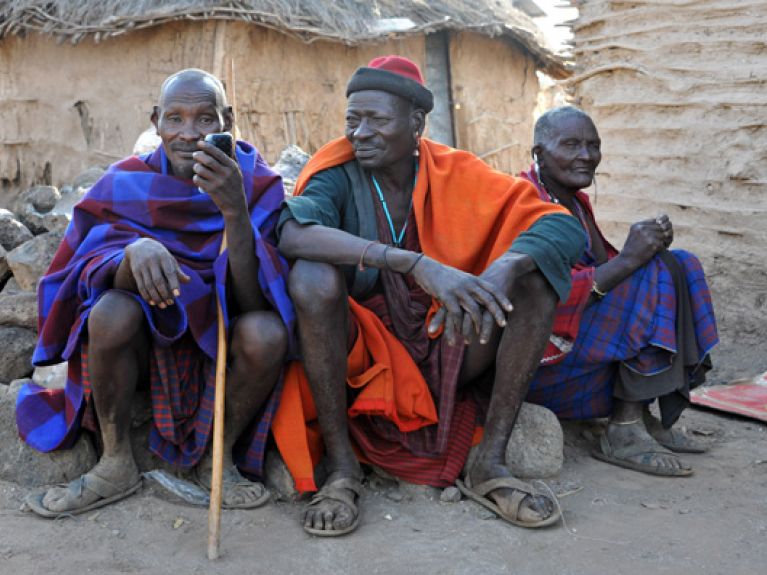Pioneers of the digital society
The digital boom in Africa continues unabated. Many projects are transforming it into positive social and economic developments.

Haji Ali uses smartphones to fight tuberculosis. The 35-year-old PhD student from Tanzania has chosen a tough opponent. Tuberculosis is a bacterial infectious disease that causes over a million deaths a year. The countries of sub-Saharan Africa are particularly badly affected.
A major problem in treatment is that many patients only take their drugs irregularly. Ali is therefore developing a smartphone app that reminds the patients to take their pills regularly, not to miss their next doctor’s appointment, and to live in a way that supports the healing process. The application also works offline and is graphics-based – in other words it also works where network access is difficult, language barriers are commonplace and illiteracy is widespread. “I’m interested in how mobile technologies can support the treatment of diseases even under difficult conditions,” the researcher says.
Ali is one of currently ten PhD students working in Cape Town at the Graduate College of the Hasso Plattner Institute (HPI) – a branch of the German institute of the same name in Potsdam. The HPI is a privately funded research and educational institution. It was initiated in 1998 by Hasso Plattner, co-founder and chairman of the board of the German software manufacturer SAP.
The PhD students from various African countries share a common goal: to use their programming skills to fight the problems of the African continent. They aim to develop solutions for better healthcare, education or administration, or to promote economic change – in the African context. User-oriented design is the recipe for success in such projects, emphasizes Anne Kayem, Director of the HPI college. “Our applications must take the local technological limitations and social circumstances into account. The issues involved include the low bandwidth of internet connections in some places and the limited computing power of many end-devices, but also language barriers, illiteracy and cultural peculiarities.”
The aim is for the school’s graduates to become pioneers of the digital society in Africa. Like Shikoh Gitau, HPI alumna and IT high-flyer from Kenya. She already developed several successful platforms during her training, including an employment-agency platform where job seekers can generate a CV and offer their skills in a few simple steps using their mobile phones. Today Ms Gitau works for Google in a developer group for user experience in Africa. She is also involved in several socially oriented IT start-ups.
The expansion of the mobile internet, which is already widespread in Africa, is booming like never before; newly laid submarine cables are further speeding up connections. A lively scene of software developers and digital founders is causing a mighty stir in numerous technology centres between South Africa’s “Silicon Cape” and “Silicon Savannah” in the Kenyan capital Nairobi.
More and more projects are trying to transform this digital boom into positive social and economic developments – a trend that doesn’t stop at international development cooperation. “It would be difficult to name projects in which the application of information and communication technologies (ICT) play no role at all in achieving the development targets,” says Franz von Weizsäcker, who specialises in the subject at the German Society for International Cooperation (GIZ). “Important areas of application are to be found, for example, in education, economic development and governance.” The GIZ had carried out more than 150 ICT-related projects in the last 15 years, he said. Private, mostly German companies, e.g. Deutsche Telekom and SAP, were involved in about 40 of these projects. It was not about donations or charity, but about organising activities in such a way that entrepreneurial success also led to improvements in living conditions for the local people, says von Weizsäcker.
In a recent project, for example, the GIZ implemented a digital management and payment system together with SAP and the Uganda Coffee Farmers Alliance (UCFA). “Until then our entire administration had been based on paper and cash,” says Tony Mugoya, the UCFA’s managing director. “It was cumbersome, inefficient and vulnerable to fraud and corruption.” The coffee growers – all small-scale farmers – often had no access to topical market information, making them dependent on the arbitrariness of the intermediaries.
Now the entire trading chain has been digitized – from the individual members and their products via the intermediaries to exports. The app informs the farmers about the latest market prices. Payments are made by mobile phone – using local mobile-money providers like Yo Uganda. “And it’s easy for us to analyse our members’ production and trends and write reports,” says Tony Mugoya. Such reports in turn help the small farmers to negotiate microcredits.
About 15,000 coffee producers are already registered with the system, and an evaluation of the first season shows that the prices achieved by the digitized UCFA farmers were approx. 15% higher than the average. “This means that the feasibility of the system has now been proven,” says Christian Merz, who is in charge of the project at SAP. The company has already tested the system in more than ten pilot projects involving, for example, cashew, rice and cocoa farmers. SAP is now preparing for the commercial distribution of the trading platform – as a bridge between the world market and the informal agricultural sector. The aim is that it should not only benefit large-scale agriculture groups in future, says Christian Merz: “We’re still looking for a pricing strategy that also gives smaller customers access.”
